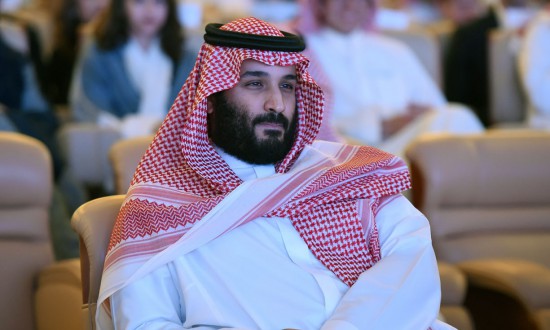Saudi Arabia: 201 people held in $100bn corruption inquiry
An estimated 1,700 bank accounts have been frozen in inquiry observers say is power grab by crown prince to sideline rivals. More than $100bn (£76bn) has been misused through corruption and embezzlement in Saudi Arabia in recent decades, the country’s attorney general has said, as he announced the detention of 201 people as part of a sweeping investigation.

Mohammed bin Salman is leading the investigation as the head of a new anti-corruption committee. Photograph: Fayez Nureldine/AFP/Getty Images
Gen Saud al-Mojeb said in a statement that 208 people had been called in for questioning since Saturday evening, and that seven people were released without charge.
The figure released by the government is far larger than previously reported as it appears more arrests were made throughout the week.
Overnight on Saturday it emerged that 11 princes and 38 officials and businessmen had been detained. They are being held at five-star hotels across the country, including the Ritz-Carlton in Riyadh.
Critics and observers say the purge that has targeted top princes, officials, military officers and businessmen is a power grab by the crown prince to sideline potential rivals and critics.
Among those detained are billionaire Saudi Prince Alwaleed bin Talal and two of the late King Abdullah’s sons, including Prince Miteb bin Abdullah, who until Saturday had headed the powerful National Guard before he was ousted and detained. Miteb was once a contender for the throne and was believed to be opposed to the king’s 32-year-old son, Mohammed bin Salman, becoming successor as crown prince.
The crown prince is leading the investigation as the head of a newly-formed anti-corruption committee.
“The potential scale of corrupt practices which have been uncovered is very large,” the attorney general said, adding that based on investigations over the past three years, at least $100bn had been misused through corruption.
The government has declined to name the individuals being questioned, saying it is respecting their privacy during this phase of the process.
An estimated 1,700 bank accounts have been frozen belonging to individuals. Mojeb confirmed that action was taken to suspend personal bank accounts, but did not disclose any figures. The government has stressed that only personal banks have been frozen, leaving companies and businesses so far untouched.
The investigation has spread to the neighbouring United Arab Emirates, where the central bank has asked commercial banks and finance companies to provide details of the accounts of 19 Saudis, commercial bankers have told Reuters. Almost all of the 19 are known to be have been detained.
The commercial bankers said UAE authorities had not explained why they wanted the information, but the bankers believe the authorities were acting at the behest of the Saudi government, which has said it aims to recover illicit funds.
UAE central bank officials were not available to comment, while Saudi officials did not respond to requests for comment.
The UAE, particularly Dubai, is one of the main places where wealthy Saudis park their money abroad. In addition to bank accounts, they buy luxury apartments and villas in Dubai and invest in the emirate’s volatile stock market.
For years, Saudis have complained of rampant corruption and misuse of public funds by top officials in a system where nepotism is also widespread.
Royal family members have long received undisclosed monthly stipends from state coffers built up during years of higher oil prices. The government, however, has been forced to introduce austerity measures since oil prices fell three years ago, reducing subsidies and driving up costs for average Saudi nationals.
Still, Saudi observer Thomas Lippmann said he believes the anti- corruption probe is “a power grab” because it targets only select members of the royal family and business community. He said it was also difficult to draw the line between what constitutes corruption in Saudi Arabia and how business deals, contracts and access have been won over the years.
10 November 2017
Disclaimer: All views, opinions and accounts included in the RAI News Section are those of the authors; their inclusion does not imply official endorsement or acceptance by RAI. The News Section reflects the selection of topics of informative value to the organization and its stakeholders. Its content is taken from press/media sources and does not in any way reflect official RAI Secretariat policy. RAI Secretariat is not responsible for possible inaccuracies in media reports.
